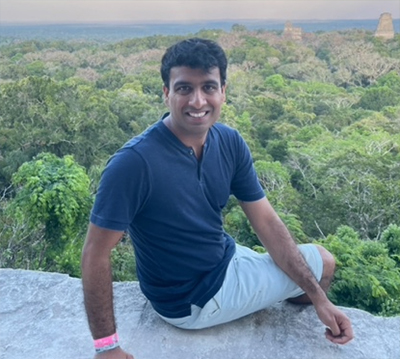
Hometown: Manassas, Virginia
Undergraduate: Virginia Commonwealth University - BS in Biomedical Engineering, BS in Physics
Graduate: College of Medicine/School of Biomedical Engineering, Science and Health Systems - MD/PhD biomedical engineering '23
Tell me a bit about yourself prior to medical school. How have your experiences influenced your interest in medicine?
Before medical school, I always dreamed of being an astronaut. I loved everything and anything related to science, and slowly started realizing my interests and passions for astrophysics and quantum physics. However, when I was 14, my brother had a severe traumatic brain injury. The urgency of what my family needed quickly shifted my focus to everything and anything related to my brother’s health care and helping him adjust to a lifelong disability. I became very focused on medicines, therapies, research and particular technologies to help in his recovery. This led me to complete two separate degrees at Virginia Commonwealth University, one in physics, a field I always had a natural affinity toward, and one in biomedical engineering, which I felt could help me truly provide immediate results for people in need.
After graduation, I joined the Peace Corps and worked in a remote mountainous village in Lesotho in Southern Africa. There, I noticed the societal inequities experienced by people in impoverished rural communities as well as by people with disabilities. I wanted to pursue both scientific and clinical routes to practical, broad solutions to these types of problems. In 2015, I joined the MD/PhD program at Drexel University College of Medicine and began my eight-year educational and scientific journey, pursuing advancements and furthering my understanding of the ways everyday inaccessibility causes challenges for people with disabilities.
Through my graduate experiences, I was further allotted opportunities to explore aerospace medicine. Because of parallels between my primary areas of study and research, technology, and applications in aerospace medicine, I’m hopeful that one day I can combine my early passions and interests with my experience in rehabilitation medicine.
Where are you for residency? What specialty did you go into, and what drew you to this field?
I am living in Boston, Massachusetts, for the Harvard Medical School Physical Medicine and Rehabilitation (PM&R) Residency, hosted by Spaulding Rehabilitation Hospital in collaboration with the Massachusetts General Hospital and Brigham and Women’s Hospital. While my early experiences and personal exposure to disability and rehabilitation medicine through my brother certainly influenced my decision to become a physiatrist, I am also extremely excited to see and be part of the development of rehabilitation medicine in the field of aerospace medicine. There is so much potential for research, technology development, and application for future, current and returning professional and commercial astronauts, that as a future physiatrist, the skillset I’m learning will be monumentally applicable and useful. Pursuing a PM&R residency was not something I did lightly, but I believe it will enable me to work on the ground amongst those with disabilities with the most immediate needs for personalized interventions and research, as well as in the aerospace field in countless, unforeseen ways.
What drew you to the College of Medicine, specifically?
I was drawn to Drexel University College of Medicine because of the hyper-collaborative relationship with the Drexel University School of Biomedical Engineering, Science and Health Systems and the revolutionary and creative researchers I’d be able to work with. During my time at Drexel, I was fortunate to work with highly flexible and supportive mentors and friends who shared my excitement for all the unique experiences in which I was able to participate. Those experiences include a Fulbright at Oxford in the United Kingdom, as well as a life-changing clinical rotation at NASA’s Johnson Space Center.
What are some of the biggest lessons from your time in medical school that you have carried into residency?
Some of the biggest lessons I learned in medical school that I will carry into residency revolve around adaptability. During my time at Drexel University College of Medicine, I was exposed to more than a dozen hospitals and so many specialties and teams, and learned that medicine is rarely conducted in a standardized fashion. I learned to adapt my presentations, my style of work and my expectations depending on the week. Adaptability is a skill that is useful in several fields of work, but in residency, it will help me succeed amid variable rotations and changing teams.
What are some of your favorite memories from your time as a College of Medicine student?
I have a few key memories from my time as a College of Medicine student, from making friends on our orientation bus tour of Philadelphia, to Pokemon Go study breaks with classmates. I loved being amongst so many fascinating researchers during my PhD and eating clotted cream and scones with my British mates and Fulbright friends in foggy and misty English towns. And when I returned to medical school, I made memories getting lost in the hospital and discovering the necessity of 6 a.m. coffees with other third-years. While the pursuit of medicine certainly had its challenges, I am very thankful and fortunate to have been surrounded by authentic and good-hearted people throughout my eight years studying at Drexel and living in the beautiful city of Philadelphia.